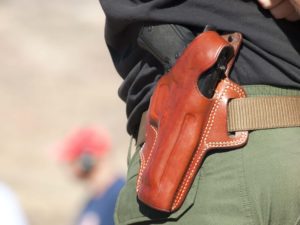We often hear that, if the government requires training and a license to drive to make the roads safer, then it makes sense that we would require people to obtain training and a license before they carry a firearm. This article is meant as a response to this comparison and to show why we believe states should adopt Constitutional carry, as many states have already done. For those who don’t know, Constitutional carry means that a state does not require training or a license to carry a firearm, and I will explain why I think Constitutional carry is desirable.
I am an attorney in Indiana and an affiliate attorney with the Armed Citizens Legal Defense Network. My family and I also run a firearms training company. In addition to teaching introductory handgun courses to beginners, we also conduct a self-developed 5-hour seminar on the legal concepts we think people need to know if they want to possess or carry a firearm for self-defense. Even though we have this training business and would benefit greatly from a state mandated training requirement, we do not favor a training or licensing requirement in order to carry a firearm, and we support Constitutional carry for the reasons I will explain below.
License to Carry vs. License to Drive:
Unlike our driving privileges, our right to carry a firearm stems from a natural right to self-defense, which is recognized and protected by the 2nd Amendment. This right is one of the many rights the founders described as being endowed by the Creator and unalienable. This natural right to self-defense is based upon a theory of property rights that recognizes the greatest property right is the right to your own body. If every man has the absolute right to his justly-held property, including most importantly his body, it follows that he has the right to defend himself from violence with violence, if necessary.
There is no such fundamental property right at issue when driving a car. That is, driving a car does not stem from a similar natural right or enjoy a similar Constitutional protection. Driving a car is merely a privilege. Given the fundamental difference between the right to carry a firearm for self-defense and the privilege to drive a car, there is consequently a great deal of difference in the amount of restrictions the government can place on each. So, I do not think our driving privileges should be viewed on equal footing with our right to self-defense when considering what restrictions to impose on our right to self-defense. With this philosophical distinction in mind, let’s consider a few practical matters.
Effectiveness of a Training Requirement:
There is a great deal of research that shows that many people use firearms for self-defense each year. These events are commonly referred to as defensive gun uses (DGUs) and occur as often as 2.5 million times each year according to a study by Gary Kleck from Florida State University. Furthermore, John Lott has also shown that where there are more guns, generally, there is less crime. John Lott has also studied the effectiveness of licensing and training requirements.
What the studies have shown is that state mandated firearms testing/training requirements have little or no effect. The training requirements are simply a hurdle to the exercise of a Constitutionally protected natural right. In fact, there is some evidence to suggest that states with training requirements have worse outcomes because the poor and/or minimal training that people receive nonetheless gives them a false sense of competence. Furthermore, I have observed that it is actually harder to find quality training in states with a training requirement because there are so many instructors who provide “training” in order to make a quick buck by providing the state mandated training. This, in my experience, makes it more difficult to find a quality instructor.
Furthermore, the costs imposed by a licensing requirement overwhelmingly affect the rights of poor people disproportionately more than affluent people. Poor people are more likely to be victims of violent crime but are most likely to be deterred from obtaining a license to carry because of the cost associated with state licensing requirements.
Forgive the cynicism, but the predominant effect of required licensing and training is probably revenue for the state. Frankly, when discussing the monetary impact of state license and training requirements, and after listening to the legislative debate regarding the prospect of Constitutional Carry in Indiana, we have concluded that the primary motive of licensing and training schemes, like many other government programs, is predominantly motivated by the desire to raise money for the state and various police programs. As with many government programs, the desire to raise money is generally accompanied by the emotive appeal to public safety.
Conclusion:
While we absolutely agree that people should get training, government mandated licensing and training does more harm than good — as is the case with most things the government touches. We have become so conditioned to ask the government for permission that we live in a world where we sometimes think we should ask permission to exercise our most fundamental rights (and I don’t mean driving a car). The more closely related right is the right to free speech, and we don’t need permission to speak except in very rare instances.





